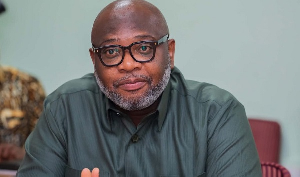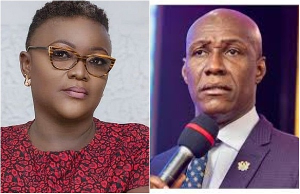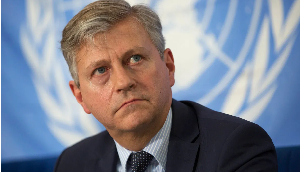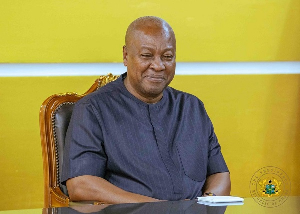A private legal practitioner has questioned the decision by a lower court to remand a top police officer who is facing treasonable offence for his alleged involvement a coup plot to destabilise the country.
Ahead of committal proceedings, police prosecutors on November 6 put ACP Dr Emmanuel Agordzo before the Kaneshie District Court to seek his remand as it raced against time in meeting the 48-hour constitutional provision.
Lawyers for the senior police officer however raised preliminary objection, arguing the court lacked jurisdiction to entertain the prosecutors on the issue of remand and or bail application.
In their view, since the court lacks jurisdiction to grant bail in first degree felony cases, it cannot arrogate unto itself the power to remand, but the court disagreed with the defence team, insisting it is cloaked with the powers to remand the accused in committal proceedings.
It thus refused Friday to step down the case to enable the defence to seek interpretation of the issue at the Supreme Court.
Appearing on TV3 news analysis show, The Key Points, on Saturday, the private legal practitioner suggested the court erred in remanding the accused person as requested by the prosecutors who are yet to file committal proceedings against the officer.
For Mohammed Sammani Zachary, once the prosecutors knew the charges they intend to proffer against Dr Agordzo, and were only going to seek his remand, they ought to have put him before a court that has jurisdiction to hear the treasonable case.
“…they were expected to take him to a court that has jurisdiction to consider the application for bail because what the constitution was saying was that when you present the person to court, the court then has to determine whether the person should be in custody or be bailed,” he argued.
He argued that the law requires that prosecutors “give the court the reason why” an accused person should be remand in custody and the accused person given equal opportunity “to make the case why he should be given a bail”.
“What the judge ruled was that as a committal court, it can only remand. Now I find that a bit curious because if the constitution gives you power to decide to remand, impliedly, you also have the power to decide that no, this person should not be remanded based on the facts that you’ve given me,” he said.
Mr Zachary said for the court to decide that it can only remand but cannot grant bail was farfetched, saying “I think that is problematic”.
Although he said the law requires treasonable cases to start from the district courts with committal proceedings that does not cloaked the lower court the authority be making a decision to remand an accused person going through committal proceedings.
“Committal proceedings are started in the district court [but] committal proceedings are differently different from application for bail,” he stated.
He added: “You can be conducting your committal proceedings and then send the person to the right court to ask for bail or not to be granted the bail”.
“I thing that having regard to the kind of authorities that were put before the district court to decline jurisdiction to hear application for bail, I thought that the district court ought to have declined jurisdiction and asked the BNI to send the accused person to the high court for the high court to decide whether to be remanded or not,” he said.
In his view, there is nothing wrong for a person going through committal proceedings to be given bail because “the person can be coming from home, he can be coming from the custody of the BNI or the police”.
What is the case against Dr Agordzo?
ACP Dr Agordzor has been charged with abetment to commit treason felony.
Prosecutors told the district court Friday that the senior police officer in November last year did abet Dr Federick Yao Mac-Palm, the prime suspect in the alleged coup plot case, and eight others with the intent to commit the crime.
According to the prosecution the accused person held several meetings with the leadership of the Take Action Ghana group who are currently in custody.
He was said to have “incited them to demonstrate against the government and to take over the government as a right”.
In his quest to show his commitment, the prosecutors said Dr Agordzor assisted “the enterprise with various sums of money to facilitate the organisation of the intended unlawful demonstraton and the taking over”.
He allegedly “drafted a speech to be delivered on that fateful day of the demonstration,” the court heard
The prosecutors told the court that further investigations into the case is ongoing.
General News of Saturday, 9 November 2019
Source: 3new.com













